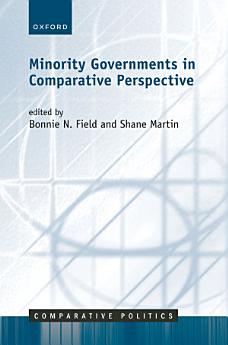Minority Governments in Comparative Perspective
Bonnie N Field · Shane Martin
sept. 2022 · Oxford University Press
Carte electronică
304
Pagini
family_home
Eligibilă
info
reportEvaluările și recenziile nu sunt verificate Află mai multe
Despre această carte electronică
Approximately one-third of parliamentary democracies are or are typically ruled by a minority government - a situation where the party or parties represented at cabinet do not between them hold a majority of seats in the national legislature. Minority governments are particularly interesting in parliamentary systems, where the government is politically responsible to parliament, can be removed by it, and needs (majority) support in the parliament to legislate. The chapters in this volume explore and analyse the formation, functioning, and performance of minority governments, what we term the why, how, and how well. The volume begins with overviews of the concept of and puzzles surrounding minority governments in parliamentary systems, and establishes the current terms of the debate. In the thirteen chapters that follow, leading country experts present in-depth case studies that provide rich, contextualized analyses of minority governments in different settings. The final chapter draws broader, comparative-based conclusions from the country studies that push the literature forward and outline directions for future research on minority governments. Comparative Politics is a series for researchers, teachers, and students of political science that deals with contemporary government and politics. Global in scope, books in the series are characterized by a stress on comparative analysis and strong methodological rigour. The series is published in association with the European Consortium for Political Research. For more information visit: www.ecprnet.eu . The series is edited by Nicole Bolleyer, Chair of Comparative Political Science, Geschwister Scholl Institut, LMU Munich and Jonathan Slapin, Professor of Political Institutions and European Politics, Department of Political Science, University of Zurich.
Despre autor
Bonnie N. Field is Professor of Political Science in the Department of Global Studies at Bentley University. Her research interests centre on political parties and political institutions in transitional and institutionalized democracies in Europe and Latin America. She studies minority governments, parliamentary regimes, interparty relations in parliament, processes of candidate selection and political appointments, and regime democratization. She has been a Visiting Scholar at the Center for European Studies at Harvard, a visiting researcher at the Universities of Barcelona and Oslo, Faculty Fellow at the University of California, Irvine, Visiting Fellow at UCI's Center for the Study of Democracy, and Fulbright Senior Researcher in Spain. Shane Martin holds the Anthony King Chair in Comparative Government at the University of Essex where he also serves as Head of the Department of Government. His research focuses on legislative organization and in particular on how electoral incentives shape representatives' preferences, the internal structures of parliaments, executive oversight, and the production of public policy. He maintains a strong interest in Irish politics. He previously taught at the University of Leicester, Dublin City University, the Pennsylvania State University, and the University of California, San Diego.
Evaluează cartea electronică
Spune-ne ce crezi.
Informații despre lectură
Smartphone-uri și tablete
Instalează aplicația Cărți Google Play pentru Android și iPad/iPhone. Se sincronizează automat cu contul tău și poți să citești online sau offline de oriunde te afli.
Laptopuri și computere
Poți să asculți cărțile audio achiziționate pe Google Play folosind browserul web al computerului.
Dispozitive eReader și alte dispozitive
Ca să citești pe dispozitive pentru citit cărți electronice, cum ar fi eReaderul Kobo, trebuie să descarci un fișier și să îl transferi pe dispozitiv. Urmează instrucțiunile detaliate din Centrul de ajutor pentru a transfera fișiere pe dispozitivele eReader compatibile.








